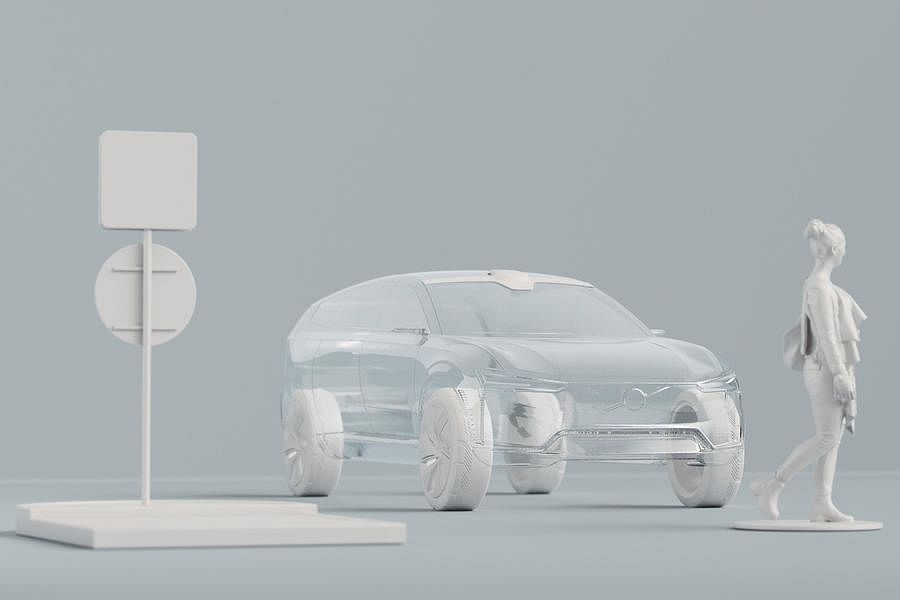Volvo targets 1,000km EV range by 2030
Swedish firm showcases new hardware and software technology that will underpin future generations of electric vehicles
Volvo boss Hakan Samuelsson has unveiled plans for the firm to become a leader in the premium electric car market, through the use of new technology that it says will boost the range, safety and functionality of its cars.
The plans were detailed at the Swedish firm’s Tech Moment event. Introducing the event, Samuelsson said that Volvo, which has committed to becoming an electric-only company in 2030, is aiming to further grow its share of the premium EV market through a commitment to new systems.
“It’s about electrification, and that requires that we build in-house new technologies, such as batteries: we can’t just buy that and rely on a relationship with a supplier,” said Samuelsson. “We need to go deeper and understand batteries in the way we understand a combustion engine. We need to understand charging, and anodes and cathodes and so on.
“We have, of course, software. In the future, a lot of functionality comes from software, and it’s too slow and inefficient to specify what we want and get it in a black box from a supplier. That does not allow us the functionality we need from Volvo: we need to rely on a central computing platform and in-house software. It’s almost as big a difference to the industry as electrification.
“The third are we will lead in is safety. We will really strengthen that position through new technology, allowing us to reach a whole new level of safety. This will be a trademark: you will see on the top of the cars a LiDar, and then you will know it’s a really safe car.”

Volvo to use real-time data to boost safety
Volvo has revealed plans to use real-time data from customer cars to develop rapid improvements to boost the safety of its next-generation cars and accelerate the development of autonomous technology.
The Swedish firm has long had a focus on safety systems, and has previously used traffic data to refine and enhance its safety systems. But Volvo is aiming to take that further with its next-generation electric cars by collecting real-time data - if customers give their agreement.
The data collected would include information taken from the high-resolution LiDAR sensors, which will be fitted to next-generation Volvo vehicles. LiDar radar systems have traditionally been used mainly for autonomous systems, but Volvo says adopting them on all EVs will help to boost safety in all driving uses. It is also developing its semi-autonomous driving systems that will be offered through the new software and hardware technology.
Volvo says will allow it to validate its autonomous systems faster, enabling it to accelerate its adoption in safety. The real-world data will allow it to hone the systems for specific locations faster than using test cars on a special track.
Volvo will also use over-the-air updated to add news systems and features to its cars, which will include upgrades to safety systems. The first car to use this technology will be a new SUV, the next-gen XC90, which will be built on an EV-only ‘technology base’.
Asked about the extra cost of fitting LiDar systems as standard to all cars, Samuelsson admitted it was high, but said: "You have to see together with the value, and the value is to really build the safety car possible using all technology available. A car with LiDar will be safer than a car with just cameras, and Volvo really needs to use all available technology. We can't afford to not have a LiDar on a Volvo when the technology is ready."
Volvo says will allow it to validate its autonomous systems faster, enabling it to accelerate its adoption in safety. The real-world data will allow it to hone the systems for specific locations faster than using test cars on a special track.
Volvo will also use over-the-air updated to add news systems and features to its cars, which will include upgrades to safety systems. The first car to use this technology will be a new SUV, the next-gen XC90, which will be built on an EV-only ‘technology base’.
Asked about the extra cost of fitting LiDar systems as standard to all cars, Samuelsson admitted it was high, but said: "You have to see together with the value, and the value is to really build the safety car possible using all technology available. A car with LiDar will be safer than a car with just cameras, and Volvo really needs to use all available technology. We can't afford to not have a LiDar on a Volvo when the technology is ready."
That machine will feature a raft of news safety systems and sensors, including a new Laminar-developed LiDar system and a bespoke Nvidia-developed autonomous driving computer. Volvo claims a combination of these advanced hardware and software systems will lead to a significant increase in its safety package, reducing accidents and fatalities.
Volvo is working with its autonomous driving software arm, Zenseact, to develop a data factory that can store more than 200 PebiBytes (225 million gigabytes) of data.
RELATED ARTICLES
Autoliv Plans JV for Advanced Safety Electronics With China’s HSAE
The new joint venture, which is to be located strategically near Shanghai and close to several existing Autoliv sites in...
JLR to Restart Production Over a Month After September Hacking
Manufacturing operations at the Tata Group-owned British luxury car and SUV manufacturer were shut down following a cybe...
BYD UK Sales Jump 880% in September to 11,271 units
Sales record sets the UK apart as the largest international market for BYD outside of China for the first time. The Seal...






 01 Jul 2021
01 Jul 2021
 5028 Views
5028 Views












 Ajit Dalvi
Ajit Dalvi




